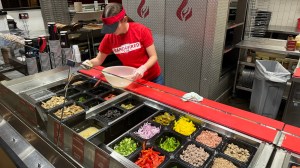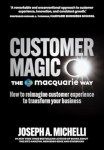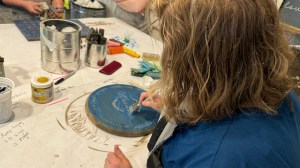Leading Extraordinary and Memorable Customer Experiences

I am reading my good friend, Dr. Joseph Michelli’s latest book, Customer Magic – The Macquarie Way: How to Reimagine Customer Experience to Transform Your Business right now. It is awesome! This book is truly where leadership meets the customer experience. Leadership really is about the customer experience. I became a better leader and educator when I started reading Michelli’s books and got to know him. By the way: I’ve read all his books. This book has one thing in common with all the others – it is taking me to another level.
I just wrote a blog post this past weekend about having favorite places to go in Finding New Favorites. What makes favorites? The customer experience! What makes the customer experience? The people!
As Dr. Michelli asks:
- Do you consistently deliver extraordinary customer experiences?
- Do you consistently deliver memorable customer experiences?

No matter what we do, we need to be able to answer “Yes” to these questions. Once I figured that out, I became a better leader. Tonight I am on the road working with schools in southern Indiana. While staying in Jeffersonville, Indiana I have a favorite place that I like to get dinner that is right next to my hotel, Rapid Fired Pizza. Why do I go there? Addison! All day I was hoping Addison would be there to make my garden salad. She is super friendly, remembers what I like and adds extra cucumber and green onions, because they are my favorite. No matter how busy they are, she always takes her time to get it right. Yes, Rapid Fired Pizza has great products, but the customer experience that Addison provides has made this a favorite. Addison has, what is called in the book, the “service gene.”
THE WORD SPREAD
“Pizza lovers told their friends about us. Growing by popular demand, you’ll now find us serving amazing pizza in 25 towns and cities across the US.” ~ Rapid Fired Pizza

I recommend Rapid Fired to everyone. Here’s how I answer The Ultimate Question: I am “extremely likely” to recommend Rapid Fired Pizza to a friend or colleague. It is recommended in Michelli’s book that this is the only Net Promoter Score (NPS) question we need to ask. If you want to know more, and I hope you do – read Customer Magic – The Macquarie Way: How to Reimagine Customer Experience to Transform Your Business. Michelli told us, “Some 34 years and 12 books later, leaders clearly understand that customer experiences create brand differentiation, repeat business and positive word-of-mouth” (p. 89). Addison certainly understands this and is certainly differentiating Rapid Fire Pizza, gained me as a repeat customer, and has me for a recommendation.
Finding New Favorites

This weekend marked the end of an era for me. Last year my son graduated from Murray State University and then yesterday his girlfriend graduated from Murray State as well. We were in Murray, Kentucky for the festivities this past weekend and it gave me a chance to reflect on the last five years. We have come to love the Murray area and have several favorite places we like to visit. We went to several of them this past weekend, including:
- Mister B’s
- Bad Bob’s Barbeque
- Hitching Post & Old Country Store
- Land Between the Lakes
- Elk & Bison Prairie
- Off The Hoof
- Pattie’s 1880’s Settlement
- Murray Donuts

Hard to believe I’ve developed so many favorite during the past five years. And that’s not even all of them. There just wasn’t time for all of them on this trip. As we prepared to head home yesterday, I started to get bummed that I would not have a reason to be back in Murray to go to my favorites. Then I began to think about new adventures that still lie ahead in my son’s new hometown of Owensboro, Kentucky. In the past year we have begun to explore those. There are so many new places to go and see, like Windy Hollow Restaurant (see feature photo).
This reflection highlighted our need to be forced out of our comfortable patterns from time to time. Finding new favorite places thrusts us into unfamiliar situations. Going new places, experiencing new cultures, trying food off new menus stimulates or brain in new ways, pushing us to think differently. This encourages us to have more creative thinking. So, instead of letting myself get bummed about life changing and moving on, I am getting excited about all the new adventures ahead.
I am now more excited than ever for new and unchartered territories in both my personal life and professional life that will offer richer and even more unique experiences. Join me in embracing the making of new favorites. These new favorites will create new stories, perspectives, and wisdom that will offer invaluable insights and inspiration. What are your new favorites?
Our World Is Not A Mirage

I just finished reading Table for Two by Amor Towles and of course there was one more thing said in this awesome book that caused me to reflect. In the conclusion, Evelyn said, “Because, If we don’t stare down the things that make us want to look away, then the world is just a mirage.” This is one of those statements that really makes you think. It’s all about mirror neurons. These mirror neurons in our brain are what enable us to have comprehension of empathy and give compassion. They also make it possible for us to figuratively feel someone’s pain, so that also triggers a looking away response. So, the reality is, there are things that make us want to look away.
“We carry each other’s pain. We learn together, or we do not learn.” ~ Nora Bateson in Small Arcs of Larger Circles
As I reflect on the phrase, “Because, If we don’t stare down the things that make us want to look away, then the world is just a mirage,” I interpret it as emphasizing the importance of facing difficult and uncomfortable truths or challenges head on in order to truly understand and navigate the complexities of the world. So many times we are guilty of looking away and believing someone else will take care of it or the issue doesn’t affect us. Avoiding or ignoring uncomfortable realities, however, only leads to a distorted and superficial perception of reality, like a mirage that disappears upon closer inspection. The mirage is such a powerful metaphor here.

“Before all else we are of the ecosystems. ‘I’ will be different tomorrow. So will you, all of you, us, they.” ~ Nora Bateson in Small Arcs of Larger Circles
We are also reminded that effective leaders must have the courage and willingness to confront difficult issues head-on rather than turning a blind eye, in order make informed decisions and drive positive change. There will always be flaws in the world around us. One thing is for sure; the world is not a mirage. Our personal actions have an impact on everyone else and visa versa. We must not turn a blind eye, but stare down the flaws and look for solutions.
Sometimes The Door Opens Twice

“Sometimes the door opens twice.” This phrase was said by Litsky in Table for Two by Amor Towles and got me thinking about the phrase we’ve all heard that my mom used to tell me: “When one door closes another one opens.” This phrase, when my mom said it, was not cliché. She really believed it and guess what? I believe it too. New opportunities do arise after failed dreams. Sometimes we create those opportunities, others sometimes intervene on our behalf, and other times we are in the right place at the right time.
“Luck is what happens when preparation meets opportunity.” ~ Roman philosopher Seneca

I loved the phrase, “Sometimes the door opens twice” because we are so locked in to the mindset that opportunity knocks but once. We actually say it this way: “opportunity seldom knocks twice.” Many times we are offered an opportunity a second time or given a second chance. We can put ourselves in a position to have the door open twice. The second time the door opens may mean it is a good opportunity and that you should seriously consider it. A door opening for the second time may also signal the opportunity is important and that you should not let it pass you by.
The only way to know is a door is right for you is to go through it. A door might open a second time so we can continue to work on a dream. Other times the open door might be leading to something that you never considered before. Let’s all make sure we are looking for open doors.
The Moral of The Story

Another statement in Table for Two by Amor Towles gave me pause for thinking. In Finnegan it was said, “Every story has a moral, Doherty used to say, but most have more than two.” As I pondered this, I realized that while every story may have a lesson or moral to be learned, some stories may have multiple morals or lessons that can be taken away from them. This just highlights the complexity and depth of stories and the various ways in which they can be and understood. The moral(s) of the story enable us to visualize ideals. We need context as well as content. The best morals of stories are evocative and elicit emotion.

The leadership story of Abraham Lincoln is one such story with multiple morals. One moral that can be drawn from his leadership is perseverance in the face of adversity, as he overcame numerous challenges throughout his life. Another moral could be the importance of honesty and integrity, as Lincoln was known for his honesty and ethical behavior. Additionally, his ability to unite a divided nation serves as a moral of diplomacy and compromise in leadership.
Great stories convey multiple meanings and make complex ideas understandable. There is power in the story.
Cultivating Our Garden

I recently reread the novella Candide (1759) by Voltaire. To me, Voltaire was teaching us about the real world where there is crime, murder, war, pandemics, and stupid people, but also great people and great things happening. The last sentence in the book has Candide saying, “…but let us cultivate our garden.” I interpret that as a metaphor for focusing on personal responsibilities and living a simple, productive life. Candide suffered a great deal of misfortune, yet he still remained grateful for all he had. We need to spend our time working on all the tasks we excel at and our lives will improve considerably.
“All that is very well,” answered Candide, “but let us cultivate our garden.” ~ Voltaire, Candide, Conclusion
In the end, Candide realized that individuals should focus on tending to their own affairs and making best of their own circumstances, rather than getting caught up the chaos and negativity of the world around them. It can also be seen as a call to action for self-improvement and taking control of one’s own destiny. Tending our garden will keep us from being idle and enable us to hone and develop our skills.
Don’t Stop Saying It

I love it when people make profound statements that really make me think. The other day I listened to a person offer to help another individual. Then the person being offered help turned down the help. Afterward, the person offering help said, “I guess I shouldn’t have offered.” Another person present said, “Don’t ever let that stop you from saying it.” What a great reply – “Don’t ever let that stop you from saying it.” Others won’t always accept our help, but that should not stop us from offering.
A leader who continues to offer help and advice, even if it is not always accepted, shows perseverance and determination. It demonstrates their commitment to their team or community and their belief in the importance of offering support. It also shows that they care about the well-being and success of those around them, regardless of whether their advice is always taken. Ultimately, it reflects their leadership qualities and dedication to making a positive impact.
The Concatenation Of Events

In rereading Voltaire’s Candide recently I was reminded of how every event in our life becomes a part of our future in some way. Voltaire emphasized the importance of understanding that everything happens for a reason and that each event in our lives ultimately leads us to our current moment He believed in the concept of fate and that we must learn from our past experiences to shape our future.
“’There is a concatenation of events in this best of all possible worlds: for if you had not been kicked out of a magnificent castle for love of Miss Cunegonde: if you had not been put into the Inquisition: if you had not walked over America: if you had not stabbed the Baron: if you had not lost all your sheep from the fine country of El Dorado: you would not be here eating preserved citrons and pistachio-nuts.’
‘All that is very well,’ answered Candide, ‘but let us cultivate our garden.’” ~ Pangloss & Candide
In a post on Medium, Naman Jain told us that, “Experiences are invaluable.” One belief of mine, however, is that experience is not a function of a number. E.g., years experience. The value of experience is not a direct function of age or of time in a role. The factors for me are what have we learned from our experiences and how are we using what we have learned to help others. Jain also told us our past experiences are valuable because:
- Personal Growth: Our past experiences, especially the challenging ones, contribute to our personal growth. They teach us valuable lessons and help us develop resilience and strength.
- Identity Formation: Our experiences shape our identity. They influence our beliefs, values, and attitudes, defining who we are as individuals.
- Decision Making: Our past experiences influence our decision-making process. They provide us with a reference point and guide us in making future decisions.
- Empathy: Our experiences, particularly those involving emotional pain or struggle, can foster empathy. They allow us to understand and relate to others’ experiences.
Are you using your experiences to shape the present and future of both yourself and others?
Creating The Right Environment

I was reminded how important it is to create an environment and program where everyone can be supported as a professional. We must create a culture that encourages continuous learning and growth, where employees feel empowered to take on new challenges and develop new skills.
It is important for a leader to provide an environment and that supports all professionals because it creates a positive and productive work culture. When everyone feels supported and valued, they are more motivated to contribute their best work. This leads to higher job satisfaction, improved teamwork, and ultimately better results for the organization.
Additionally, supporting professional growth and development helps individuals reach their full potential, which benefits both the employee and the organization as a whole. By investing in the growth and development of those we serve, we are ultimately investing in the success of our organizations.
Let The Work, Work

This past weekend during the “DIY Lasting Leadership” workshop of the Hamilton Heights School Corporation Teacher Leader Academy 3.0 Finale Summit we used the butcher paper on the tables to record leadership thoughts as we built our individualized projects. I always appreciate Hamilton Heights Middle School Principal, Bret Bailey being a part of the Finale with us. As his table participants were working, they discussed how there were steps and “layers” to the project and at times we have to let the “paint dry” and “let the work, work.” I loved this statement and we proceeded to have a discussion about it.

When a leader says “Let the work, work,” they may be emphasizing the importance of trusting in the process and allowing tasks to be completed without unnecessary interference. Also, we sometimes start new initiatives, but don’t let them play out to know if they are successful or not. This was also a reminder to take charge of our own professional development as we navigate the challenges of transitioning from an individual contributor to a leader.

Additionally, sometimes we have to manage the conditions that drive team performance, but other times leadership means “letting the paint dry” and stepping back and allowing team members to do their jobs without micromanaging or getting overly involved. It implies having faith in the abilities of the team and letting them work independently to achieve their goals. “Letting the work, work” also reminds us, as leaders, we must coach colleagues and share feedback in ways that enable them to develop and deliver.
leave a comment